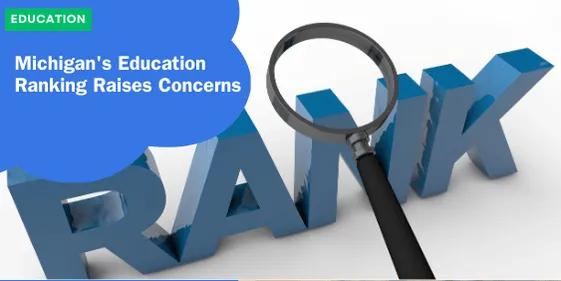Michigan’s Education Ranking Raises Concerns

When it comes to education, Michigan continues to lag behind most other states, underscoring the critical importance of ensuring that children are present and successful in their classrooms.
The startling revelations from the latest 2024 Kids Count Data Book — the most recent 50-state report on child well-being from the Annie E. Casey Foundation — should sound alarm bells for policymakers and stakeholders across the state.
A Closer Look at the 2024 Kids Count Data
According to the 2024 Kids Count Data Book, Michigan remains perilously positioned in the bottom 10 states for education, ranking 41st.
This distressing ranking is a continuation of a worrying trend observed across four key domains: economic well-being (31st), family and community (28th), and health (22nd).
Furthermore, Michigan’s performance in overall child well-being is also troubling, ranking 34th, which is slightly worse than the previous year’s position of 32nd.
These disheartening statistics demand urgent action from decision-makers on how schools are resourced and how families struggling to make ends meet are supported.
Notably, many such families have been marginalized and left out of prosperity due to past and present-day racial discrimination.
Factors Contributing to the Decline
Undoubtedly, the COVID-19 pandemic has played a significant role in exacerbating some of the learning losses reflected in the current data.
However, the Annie E. Casey Foundation emphasizes — with which experts agree — that the pandemic is not the sole cause.
For several decades, U.S. reading and math scores have shown minimal improvement, a trend that the pandemic has only worsened.
Chronic School Absenteeism: A Major Concern
During the 2021-22 school year, over half a million Michigan students were chronically absent.
Within this disturbing statistic lies an even grimmer truth: significant racial disparities exist, with more than half of American Indian and Black children persistently missing from their classrooms.
Chronic absenteeism in schools is closely associated with childhood poverty and trauma — areas where Michigan is unfortunately not performing well.
The child poverty rate in Michigan stands slightly above the national average at 18%, while nearly half of the state’s children have experienced at least one adverse childhood experience (ACE).
ACEs include traumatic events such as abuse, neglect, household violence, and caregiver mental illness.
These experiences undermine a child’s safety and stability, having lifelong implications and certainly impacting their ability to attend and be ready to learn at school.
Initiatives to Improve Classroom Readiness
An effective strategy requires ensuring that children arrive at school ready to learn.
Some essential measures to achieve this include continuing to provide universal free school meals, ensuring safe transportation to and from school, reliable home internet connections, quiet places to study, and dedicated time with teachers, counselors, and tutors.
Additionally, enhancing attendance tracking and using positive interventions to address chronic absenteeism can greatly support students who are at risk of falling behind.
The Role of Fiscal Budget and Emergency Relief
The Fiscal Year 2024 budget makes significant strides in supporting the schools and students in dire need, and it is expected that these investments — hopefully increasing in the FY 2025 budget — will help Michigan progress in the education rankings.
Moreover, some Michigan schools still possess Elementary and Secondary School Emergency Relief (ESSER) funds, which are aimed at boosting achievement.
However, these funds need to be allocated by the end of September to avoid losing them.
Addressing Family Support and Learning Loss
The learning losses sustained by Michigan and many other states during the pandemic have highlighted the pressing need to support families so young learners can have a strong foundation at home too.
Supporting schools that offer wrap-around services and addressing child poverty by adopting measures like a state Child Tax Credit, improving the Family Independence Program, and exploring other innovative methods to provide direct cash support to struggling families will undoubtedly enhance the well-being of Michigan’s children and their academic futures.
Recommendations by the Growing Michigan Together Council
Focusing on boosting student outcomes is vital for addressing Michigan’s population challenges.
This understanding has led the Growing Michigan Together Council to form workgroups dedicated to making recommendations for improving the state’s pre-K-12 education system.
To improve Michigan’s population trajectory, efforts must be focused on retaining current residents and attracting new ones, which will be an uphill battle if schools and students continue to falter.
Urgency of Addressing Michigan’s Education Crisis
The stakes in tackling Michigan’s education crisis are immense, directly impacting the state’s future growth and economic prosperity.
However, at the heart of this issue are Michigan’s vibrant children, whose futures rely on the decisive actions taken today.
Conclusion: A Call to Action for Michigan
Michigan stands at a critical juncture, with challenging yet surmountable obstacles in its education system.
To build a brighter future for our children, it’s essential to make the right choices now.
This includes ensuring families have the resources to make ends meet, providing consistent support for students both inside and outside the classroom, and implementing policies that address educational disparities and chronic absenteeism.
Investing thoughtfully and strategically in the state’s education system will yield long-term benefits, creating a robust foundation for economic development and enhancing the quality of life for all residents.
It is a collective responsibility to facilitate an environment where every child in Michigan has the opportunity to reach their full potential, equipped with the necessary skills and knowledge to succeed in life.
By prioritizing these needs and taking a holistic, informed approach to reform, Michigan can climb out of its current position in the national rankings and ensure a brighter, more equitable future for its children.
As we look to the years ahead, let’s commit to making choices that will provide Michigan’s youth with a future filled with opportunities, ultimately strengthening the state’s overall social and economic health.






